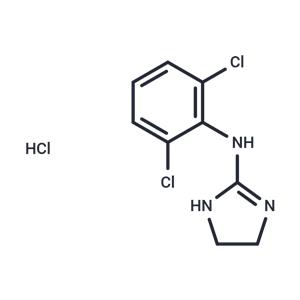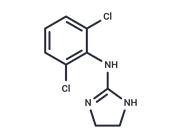| Name | Clonidine hydrochloride |
| Description | Clonidine hydrochloride (Catapres) is a centrally active α-adrenergic agonist used predominantly as an antihypertensive agent. |
| In vitro | Clonidine, at concentrations of 0.01, 0.1, or 1 μM, significantly elevates CGRP (α and β) mRNA expression in endothelial cells in a dose-dependent manner. Additionally, a 24-hour treatment with 1 μM clonidine notably augments NO levels in these cells. This indicates that the NO pathway plays a crucial role in modulating the clonidine-induced CGRP production[2]. |
| In vivo | Administered intraperitoneally at a dose of 50 μg/kg, clonidine markedly reduces rat body temperature, peaking at 1 hour and persisting for 3 hours; this effect is notably counteracted by a pre-administration of phentolamine into the cerebral ventricles[1]. Additionally, clonidine (0.003-0.05 mg/kg, i.p.) effectively inhibits PCP-induced dopamine release in the prefrontal cortex, an effect that is blocked by the alpha-2A receptor antagonist BRL-44408[3]. In normotensive rats treated with DMSO, clonidine (0.6 μg intracisternally) does not alter blood pressure, but following central adenosine A1R inhibition with DPCPX, it significantly lowers blood pressure. Conversely, in DMSO-treated aortic-banded rats, clonidine prominently decreases blood pressure, a response that remains unchanged after DPCPX pretreatment. Additionally, in SO rats with central A1R blockage, clonidine not only reduces blood pressure but also significantly elevates pERK1/2 levels in the RVLM, an effect not observed in DMSO-pretreated SO rats. Similarly, clonidine boosts RVLM pERK1/2 levels in vehicle-treated aortic-banded rats, unaffected by DPCPX[4]. |
| Storage | Powder: -20°C for 3 years | In solvent: -80°C for 1 year | Shipping with blue ice/Shipping at ambient temperature. |
| Solubility Information | H2O : 26.7 mg/mL (100.17 mM), Sonication is recommended.
DMSO : 23.33 mg/mL (87.53 mM), Sonication is recommended.
|
| Keywords | α2 adrenergic receptor | Inhibitor | inhibit | Clonidine hydrochloride | Clonidine Hydrochloride | Clonidine | Beta Receptor | AdrenergicReceptor | Adrenergic Receptor |
| Inhibitors Related | Olanzapine | Mirtazapine | Octopamine hydrochloride | Gemfibrozil | Buflomedil hydrochloride | Dexmedetomidine hydrochloride | Phenylephrine hydrochloride | Amitriptyline hydrochloride | Isoprenaline hydrochloride | Trazodone hydrochloride | Mianserin hydrochloride | Doxepin hydrochloride |
| Related Compound Libraries | Failed Clinical Trials Compound Library | Anti-Neurodegenerative Disease Compound Library | Bioactive Compound Library | Approved Drug Library | Membrane Protein-targeted Compound Library | Anti-Cancer Clinical Compound Library | Drug Repurposing Compound Library | Anti-Cancer Approved Drug Library | FDA-Approved Drug Library | Bioactive Compounds Library Max | GPCR Compound Library | Anti-Cancer Drug Library |

 United States
United States






